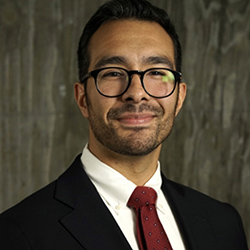
(Photo: Mike Linksvayer/Flickr)
California Forward is committed to advancing policy intersections that create a more inclusive and sustainable California where all people can prosper. To move this forward, we must reimagine a state where we address the racial and geographic inequities that have been exacerbated by a public health and economic crisis, and we must answer the call to dismantle structural racism. The Voices of Shared Prosperity series amplifies the stories of Californians who are committing their time and talent to solutions that embrace equity, environmental sustainability, and economic opportunity.
“Too often people of color are on the table – not at the table of policymaking. I want to make sure, no matter where I am, that we are front and center in terms of decision making, especially when it’s something that is going to determine the future of us and our families.”
This was the reflection of Adam Briones, the newly named CEO of California Community Builders (CCB) as he discussed his goals for the position. The former director of economic equity at the Greenlining Institute brings a strong track record and a clear vision to his role leading one of the state’s most influential housing equity organizations.
 He credits his experience working in the Central Valley to develop affordable homeownership opportunities as a seminal moment in his commitment to racial equity and affordable housing policies. During his time at the Greenlining Institute, Briones helped secure over $10 billion in community reinvestment commitments from large financial institutions.
He credits his experience working in the Central Valley to develop affordable homeownership opportunities as a seminal moment in his commitment to racial equity and affordable housing policies. During his time at the Greenlining Institute, Briones helped secure over $10 billion in community reinvestment commitments from large financial institutions.
A champion for bold reforms that close the racial wealth gap, Briones said “We need to pivot the argument from ‘do it because it’s the right thing to do but rather because it’s the thing that is going to benefit the state.’ In 20 years, California will be 70% people of color. If we’re not investing in 7 out of 10 people in the state, what are we doing?”
Taking the helm of CCB following the pioneering work of the former president and founder of the Greenlining Institute, John Gamboa, is no small task but Briones is up to the challenge. Building on the foundation that has been created, Briones offers specific recommendations to close the racial wealth gap and equalize economic opportunity in the state, including:
- Creating power for people of color, women, and communities that have never had it. Briones insists that economic wealth is a primary component of a self-determined life. He explained that CCB’s focus on homeownership is because it is the means by which most Americans have been able to accumulate wealth. “If you give someone access to an affordable home that they can keep in their family, they are going to use it to start businesses, finance schools, finance their retirement, and help their family grow, thrive, and achieve what they want to achieve.”
- Protecting and maintaining the assets that have been accumulated. Briones highlights the importance of protecting communities from predatory lending and addressing wide-reaching negative financial impacts, such as the student debt crisis. He pointed specifically to the Community Reinvestment Act as a piece of legislation that can be strengthened to support vulnerable communities. Referring to the 2008 economic crash, he explained “[if] we had a stronger Reinvestment Act that was modernized and ready for the challenges of the 21st century it would have been better for the business sector, community, government — everybody.”
- Making sure homeownership and housing are accessible in California. “This is the way most Americans build wealth, but it is out of reach for so many communities here in California and unfortunately, it’s really out of reach for African-American and Latino communities.” He emphasized the impact to families and generations that have built communities in corridors throughout California’s regions that are no longer able to stay because of an artificially created scarcity of housing. He said, “More than two-thirds of residential land in CA — and 70% – 80% in Los Angeles and the Bay Area, respectively — bans apartment building. This means you are not going to build enough housing for the residents that are moving here and are from here. This makes it nearly impossible for low-income people to get a leg up.”
| The California Dream Index indicates that even after a decade of economic growth, home ownership rates have declined 4.5% since 2010. During that same period home ownership rates declined over 11% for Black Californians and 6% for Latino Californians. Learn more here. |
|---|
- Investing in the next generation of leaders. “We need to figure out a way to make it so that more people of color can be engaged in public policy and can make the decisions that are really going to be defining for their communities for generations.” There needs to be an intentional effort to make sure these people have the opportunity to earn and maintain wealth. Housing is the primary vehicle by which many Americans have been able to accomplish this.
Briones uses his experience to amplify the work ahead of him. “The ethos of Greenlining is one that I am hoping to carry over to CCB, which is to train the next generation of leaders of color [who share the understanding] that people who are impacted by policies are the ones who have the best ideas and the best solutions to fix the problems that were fundamentally created by public policy,” said Briones.
Briones continues to invest his expertise in the development of equitable opportunities and paths to wealth building for all Californians.

